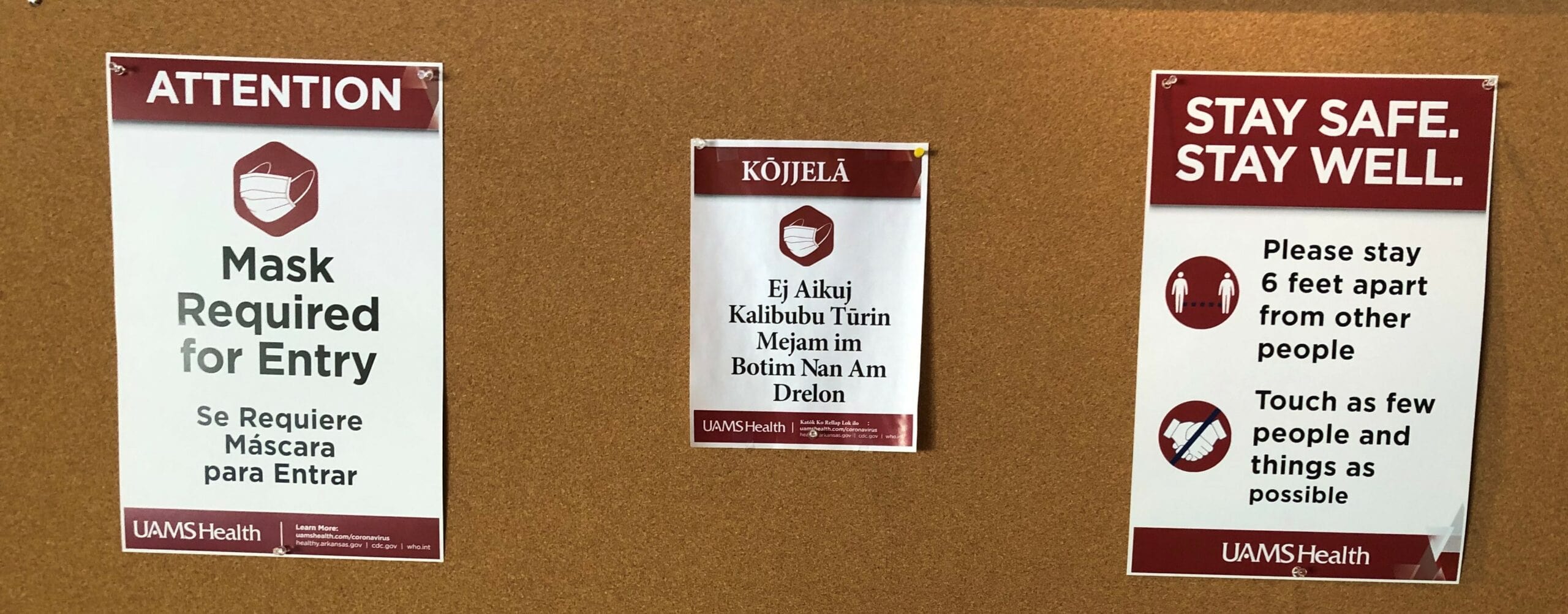Researchers Find Links between Sociodemographic Factors, COVID-19 Preventative Efforts
| FAYETTEVILLE – During the COVID-19 pandemic, most Arkansans wore masks and washed their hands regularly to prevent the spread of COVID-19. However, fewer Arkansans limited social interactions, according to a study conducted by the University of Arkansas for Medical Sciences (UAMS) Office of Community Health & Research.
The study, “Relationship Between Sociodemographic Factors, Perceived COVID-19 Risk and Engagement with Health Protective Behaviors,” which was published in the Southern Medical Journal, analyzed protective health measures Arkansans engaged in during the summer of 2020 to prevent the spread of the coronavirus.
Of the 1,205 participants surveyed, about 97% reported that they commonly wore a face covering in public and washed their hands. However, only 66% of survey participants reported that they would ask friends or family not to visit during the pandemic, and about 72% said they would stay home if they were not feeling ill. Researchers noted that the survey was distributed after a mask mandate was issued in the state of Arkansas.
Researchers also found that certain demographics were more likely to engage in preventative measures than others. Key findings included:
- Older Arkansans were more likely to engage in preventative measures than younger adults.
- Women were more likely to engage in preventative measures than men.
- Black respondents engaged in more health protective measures than any other racial and ethnic group.
- Respondents with a college degree or more and those with higher annual incomes engaged in more preventative measures than those with lower levels of education and income.
“It is likely that surges in COVID-19 cases in Arkansas were a result of individuals not limiting their physical contact with others outside the home,” said Jennifer Andersen, Ph.D., lead researcher on the study and an assistant professor in the Office of Community Health & Research. “We also know isolation was simply not a choice for many Arkansans, especially in under-resourced communities or for those working in jobs that did not allow for paid time off to properly isolate. Providing support services for communities who need it the most — such as food assistance and connecting communities with affordable health services — will be crucial in future pandemic response plans.”
Researchers also analyzed how fears related to COVID-19 influenced health behaviors, and found that taking functional, preventative measures were helpful in warding off negative psychological reactions to the pandemic. The study also notes, however, that heightened awareness of the dangers posed by the coronavirus may have led to nonprotective behaviors among some Arkansans, such as denial or disengagement in health precautions.
“Providing clear guidance to protect oneself from getting sick can help that person cope with the obvious stress that’s created by a pandemic,” Andersen said. “Framing protective health behaviors as normal, everyday actions instead of a reaction to a health crisis may be incredibly helpful in future health situations.”
According to the Arkansas Department of Health, there have been about 840,000 cases of COVID-19 reported in Arkansas since the beginning of the pandemic. COVID-19 vaccines have been proven to significantly lessen symptoms of the coronavirus, which has killed more than 11,000 people in Arkansas since 2020. While the number of cases in Arkansas continues to decline, protection against the virus is encouraged by medical officials to avoid serious illness or death.
COVID-19 vaccines are available to anyone five years of age and older. The Pfizer-BioNTech booster shots are available to anyone five years and older, and the Moderna shots are available to anyone 18 and older. The Centers for Disease Control and Prevention recommend booster shots for persons five months after their initial series of vaccines.
Vaccines and booster shots have been made available to the public at no cost. For more information about COVID-19, including resources, mobile vaccine events and education, visit nwa.uams.edu/covid.
Transportation to COVID-19 vaccine clinics is available through United Way/211. For more information or to schedule your ride, visit 211.org or call 211.
UAMS is the state’s only health sciences university, with colleges of Medicine, Nursing, Pharmacy, Health Professions and Public Health; a graduate school; a hospital; a main campus in Little Rock; a Northwest Arkansas regional campus in Fayetteville; a statewide network of regional campuses; and seven institutes: the Winthrop P. Rockefeller Cancer Institute, Jackson T. Stephens Spine & Neurosciences Institute, Harvey & Bernice Jones Eye Institute, Psychiatric Research Institute, Donald W. Reynolds Institute on Aging, Translational Research Institute and Institute for Digital Health & Innovation. UAMS includes UAMS Health, a statewide health system that encompasses all of UAMS’ clinical enterprise. UAMS is the only adult Level 1 trauma center in the state. U.S. News & World Report recognized UAMS Medical Center as a Best Hospital for 2021-22; ranked its ear, nose and throat program among the top 50 nationwide for the third year; and named five areas as high performing — colon cancer surgery, diabetes, hip replacement, knee replacement and stroke. UAMS has 3,047 students, 873 medical residents and fellows, and six dental residents. It is the state’s largest public employer with more than 11,000 employees, including 1,200 physicians who provide care to patients at UAMS, its regional campuses, Arkansas Children’s, the VA Medical Center and Baptist Health. Visit www.uams.edu or www.uamshealth.com. Find us on Facebook, Twitter, YouTube or Instagram.
The UAMS Northwest Regional Campus includes 288 medical, pharmacy, nursing and health professions students, 64 medical and pharmacy residents, two sports medicine fellows, and 1,000 community-based faculty. The campus has nine clinics including a student-led clinic and physical, occupational and speech therapy. Faculty conduct research to reduce health disparities. Visit www.uams.edu or www.uamshealth.com. Find us on Facebook, Twitter, YouTube or Instagram.
